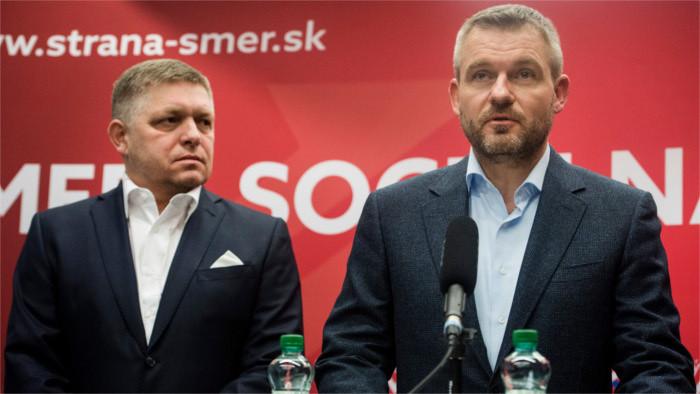The Deputy Speaker of Parliament and former Prime Minister Peter Pellegrini, who was Smer-SD's election leader in February's general election, has decided to leave the party. He announced this at a press conference in Banská Bystrica, describing his decision as one of the most difficult in his political career so far. As he said, he can no longer imagine being in the party's leadership in tandem with its current chair and "founding father", Robert Fico. Only a few hours before Pellegrini's formal declaration, Fico offered him the post of party chair, with a few conditions, however.
"I feel sorry that Peter Pellegrini did not accept the offer to become chairman of the Smer-SD party", current Smer-SD leader Robert Fico wrote on a social network on Wednesday afternoon. Fico keeps his fingers crossed for Pellegrini on his further political journey. "I'm sincerely sorry that after 20 years in the Smer-SD party he rejected this offer, especially after the party nominated him for the posts of state secretary, minister, parliamentary speaker, vice-premier and finally prime minister," said Fico, adding that the party would continue on its left-wing path, which will not change even after Pellegrini's departure.
Prime Minister Igor Matovič (OĽaNO) stated on Wednesday in reaction to Peter Pellegrini's decision, that he does not intend to collaborate with him in the future, since he considers Pellegrini someone who has been "faithfully covering up the mafia's activities for 20 years and his history shows that he has always faithfully stood by its side". Similar voices could also be heard from another coalition party. "Peter Pellegrini is a child of Smer-SD, who learned political manners in this party", Vice-premier for Investments and Informatisation Veronika Remisova (For the People) said on Wednesday. "Just because he's speaking nicer it doesn't mean he's doing nicer politics. He has been close to all the Smer-SD scandals in the past, holding the side of Robert Fico's party," said Remišová.
The success of Peter Pellegrini's potential party new hinges on who else from the Smer-SD membership base joins his project, thinks political analyst Darina Malová. What also remains to be seen is the financing of the new party. Malová believes that Smer-SD will manage to politically survive, as there is still a certain portion of the electorate favourably disposed to party chair Robert Fico. Comenius University's political scientist Pavol Baboš said that Smer-SD is a strong political brand and it will take Pellegrini a long time to truly disengage from it. His exit might not inevitably spell political doom for Smer-SD, however. The deciding factor in Babos' view will be who joins forces with Pellegrini and who opts to stay. "The potential of Peter Pellegrini is certainly enormous in terms of how many voters he can lure away from Smer," said Baboš, adding that he believes the polls are not entirely off the mark and Pellegrini's party could theoretically garner even 20 percent of votes in the next election.
Peter Pellegrini joined Smer-SD in 2000, working as an assistant to Smer MP Ľubomír Vážny. After being elected to Parliament in 2006, in 2012 he became deputy Finance Minister and in 2014 served for a few months as education minister, later as the Speaker of Parliament. In 2016, Pellegrini was installed as deputy prime minister for investment and informatisation, in 2018 he became interim culture minister after the resignation of Marek Maďarič in response to the political crisis that emerged in the country after the murders of journalist Ján Kuciak and his fiancée in late February. Later in March 2018 he was tasked with setting up a new government after the resignation of Fico's third government. For a few months he also served as an interim heath minister. In the 2020 general election, Pellegrini was the election leader for Smer-SD.

